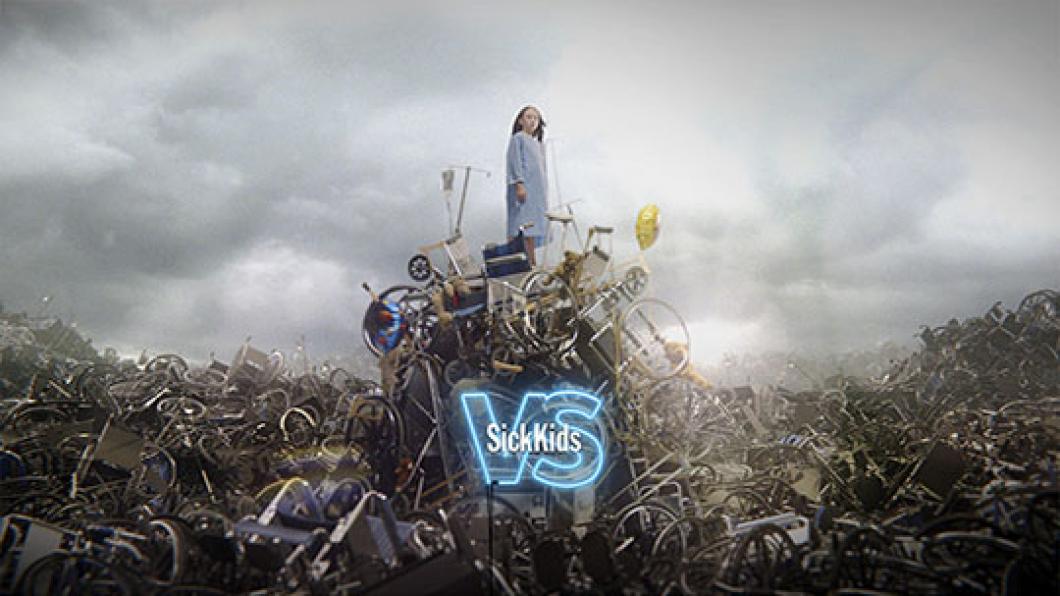
Why I can't be 'for' the 'SickKids vs' ad
By Louise Kinross
Disability is personal. It’s part of identity. When your child has significant disabilities, it becomes part of your identity too.
Perhaps this is why the Hospital for Sick Children's latest campaign video SickKids vs—which positions the hospital and its patients against cancer, kidney failure and autism, and includes this image of a girl standing defiantly atop a huge pile of discarded wheelchairs—feels like a betrayal. It’s trending now on YouTube with close to 200,000 views.
“We’re on the front line every day. And we are winning,” says the copy on the foundation page. Indeed, in the video, patients join a simulated battle line with armed 'Fort York' soldiers, hop in a boxing ring to fight cancer and smash apart a kidney dialysis machine with a bat.
I get why it’s so appealing. Viewers are encouraged to choose a fight and donate. Who doesn’t want to be a “winner?” From a fundraising perspective, I'm sure this ad has hit the ball out of the park.
But what about the messages it sends to kids and families who aren’t on the winning side?
When you define things in simple terms, you also imply that those who don’t beat their illness or disability are “losers.” Were they not as tough as the kids wearing the super hero costumes in the video? SickKids vs. plays to the song Undeniable by Toronto rapper Richie Sosa. The chorus goes “We undeniable.”
Are the kids who live with permanent disabilities or chronic illnesses, or who die from their condition, not “undeniable” enough? The word “defeat” flashes during the video. Does that mean some kids “surrender?” Do we really want to believe that children have that much control over their medical conditions? And at some point, doesn’t the concept of fighting just miss the point when we're talking about health and healing?
In her 2015 book Malignant Metaphor: Confronting Cancer Myths, science writer Alanna Mitchell writes about why the battle metaphor isn’t helpful to cancer patients and their families (she also writes about why it's not a great analogy for the latest clinical treatments). “A main concern is that when someone dies of cancer, the message that remains is that that person just hasn’t fought hard enough, was not a brave enough soldier against the ultimate foe, did not really want to win,” she writes.
Many children with congenital disabilities or complex medical problems are patients at SickKids. Their conditions and disabilities are not ones that can be defeated. Did they, or their parents, not try hard enough?
And is it really so easy to define “the enemy?”
The inclusion of autism in the video as something to be battled against is surprising given our current understanding. Autistic adults tell us that accepting and valuing their differences is the way to go. To them, eradicating autism isn’t possible without eradicating who they are as people. Most people in the disability field don’t believe autism can be “cured,” any more than sexual orientation can be changed. Even Autism Speaks just removed cure as an objective from its mission. The focus now is on helping people live good lives that they value.
I honour and respect the families who participated in the video. I understand why viewing their kids as warriors is empowering. I certainly think of my son, and our family, as warriors, but as fragile ones.
From a health organization, I expect a more complex, nuanced depiction—one that includes all kids, whether their disease is cured or not. One that shows that there are many rich ways of living, and dying. In the video, all of the triumphant patients stand on two feet. I’d like to see one rocking a wheelchair, because that’s how she’ll get around for the rest of her life. And I’d like to see more images of kids who look different, like my son, due to their genetic conditions or disabilities. These kids are SickKids patients as well. I’d like to see a video that expands our conception of human value, beauty and diversity.
We are fierce, but we are also afraid. As parents, we often feel inadequate to the enormity of our child's illness or disability. And that's okay. My dad, who served for almost six years in World War II, told me: “You learned to live with fear.”
We don't need to buck ourselves up with flashing neon lights that say: “Sick isn't weak.” For one, who ever said that patients and families were weak? And for two, what is wrong with weak? Weak just means vulnerable. It's who we humans are.
As someone whose child has had close to 20 surgeries at SickKids, I would say the humanity, the compassion, of the doctors and nurses, is what's made all the difference in our care.
I asked Alanna Mitchell what she thought of the ad.
“Yeesh!” she wrote back. “Imagine if they had those patients dancing, instead of fighting.”
At the end of her book, she asks readers if dance, rather than battle, might be a more apt metaphor for cancer. I think it’s a useful one for any disability or difference. Indeed, for any life. “Not a win or a loss,” she writes, “but a pirouette.”